SUMMARY
This is AI generated summarization, which may have errors. For context, always refer to the full article.

The Philippines and other Southeast Asian countries like Vietnam and Malaysia should run to a United Nations tribunal to declare as void China’s law allowing armed aggression by its Coast Guard in the South China Sea, said retired Philippine Supreme Court justice Antonio Carpio.
Carpio, in an interview on Rappler’s Seat of Power podcast, said Beijing’s domestic law “clearly violates” not just the UN Convention on the Law of the Sea (UNCLOS) but the UN Charter itself.
“The ASEAN states that are prejudiced by this new law of China can go to UNCLOS and get this new law of China declared void under UNCLOS and international law,” he said on Friday, January 29.
Carpio, a legal luminary who was instrumental in the Philippines’ 2016 court victory against China’s claim to the West Philippine Sea, advised the Philippine government to be ready to file an arbitration case once China enforces its new law in Philippine waters.
“For example, China drives away our survey ship in Reed Bank. We can go to the UNCLOS tribunal and say that law of China violates UNCLOS, violates the arbitral award,” said the former magistrate.
But he said countries like Vietnam, Malaysia, Indonesia, and Brunei, which also have claims in the South China Sea, should seriously consider filing an arbitration case similar to that which gave the Philippines legal victory in 2016.
This is because China might exploit what he calls a “grey area” given that these countries lack an arbitral ruling that legally settles areas they claim as belonging to their Exclusive Economic Zone.
“I think China will enforce this [Coast Guard law] against Vietnam and Malaysia first,” said Carpio.
Power of a UN tribunal ruling
No less than Philippine President Rodrigo Duterte has questioned the power of a UN tribunal to make China change its ways.
Despite the 2016 Hague ruling, China continues to fortify artificial islands in the West Philippine Sea. Still, Carpio thinks the ruling, and future steps to seek another against China, is effective in rallying the international community to “enforce” maritime laws through activities like freedom of navigation operations (FONOPS).
“This has galvanized other states, United States, UK, Germany, France, Japan, Australia, India – they all said China must abide. China is being isolated now…. That is the weapon that is at our disposal. We don’t have the Navy, the Coast Guard that can compete with China but we have the law on our side and let’s pound on that because that is our strength,” said Carpio.
He called China’s Coast Guard law a “threat against the world,” and one that all countries should fight since it endangers the general peace achieved after World War II.
“It’s a challenge to the legal order because the international legal order says you cannot do this because this was the state of affairs before World War II…. You cannot go to war and acquire maritime areas by force and China has flipped this over,” said Carpio.
Philippines should join naval drills, FONOPs
He described FONOPS as “physical, robust enforcement” of the Hague ruling and urged the Duterte administration to allow the Philippine Navy to participate in joint drills in the West Philippine Sea.
Duterte has a long-standing order prohibiting the Navy from joining such exercises, saying it would escalate tensions.
But Carpio insisted that the Philippines must send a “strong message” to China, beginning with emphasizing Manila’s Mutual Defense Treaty with the United States, the only power capable of taking China on.
Carpio welcomed new US Secretary of State Anthony Blinken’s recent affirmation that the treaty covers the West Philippine Sea, a declaration that any armed attack on Philippine vessels or personnel would trigger a US response.
“Our move now to send a strong message to China: Do not apply this law to us. We should conduct naval drills with the US in the West Philippine Sea. We should even join the FONOPS of the US in the West Philippine Sea,” said the retired magistrate.
The Philippines filed a diplomatic protest against China’s new law. Malacañang has called for the speedy completion of the South China Sea code of conduct but Carpio has said the code is rendered “useless” by China’s measure. – Rappler.com
Add a comment
How does this make you feel?
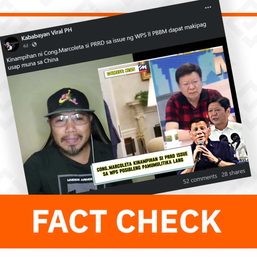
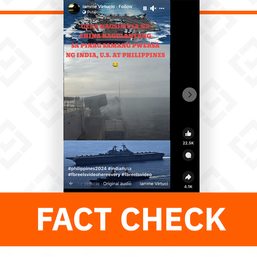
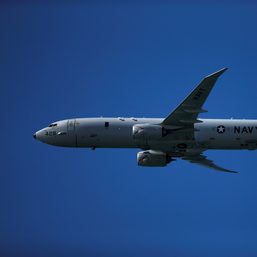





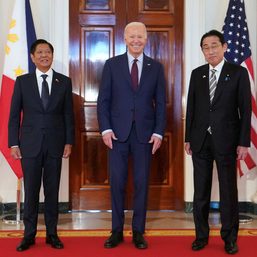

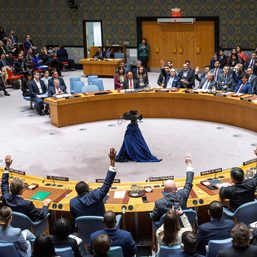

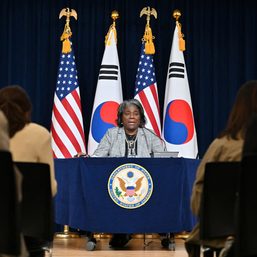


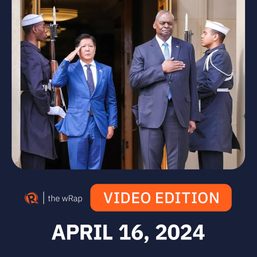


There are no comments yet. Add your comment to start the conversation.